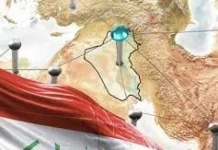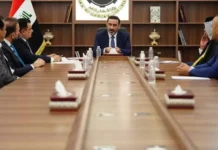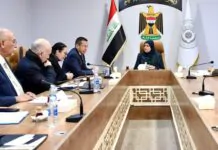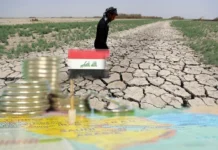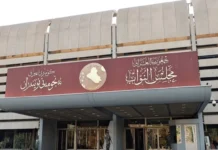Expert: US Withdrawal From Iraq Remains Formal Unless It Includes Ain Al-Assad Base
A wish | 08/31/2025 Mawazine News – Baghdad Political analyst Ibrahim Al-Sarraj stressed on Sunday that any withdrawal of foreign forces, especially American forces, will not be credible and real unless it includes the handover of the Ain Al-Assad military base and a complete withdrawal from Iraqi territory, warning of American plans aimed at destabilizing the region. .
Al-Sarraj said in a statement, “Talk about an American withdrawal from Iraq loses its true meaning if it is limited to redeployment from one base to another, such as moving from the Ain Al-Assad base to the Harir base in the Kurdistan region, because the latter is also located within Iraqi territory, and therefore cannot be considered a complete withdrawal.”
He added, “This move falls within the framework of a broader American strategy aimed at maintaining a military foothold inside Iraq, and may be part of the ‘Greater Israel’ project that seeks to redraw the map of influence in the region.”
The political analyst pointed out that “the agreement concluded between Baghdad and Washington clearly stipulates a full withdrawal by September 2025, which requires the Iraqi government to be more cautious and exert greater pressure to ensure the full implementation of the withdrawal, and not accept formal formulas or circumvent the terms of the agreement.”
This comes at a time when political and popular calls are increasing for a definitive end to the foreign presence in Iraq, as this is the only way to achieve independent sovereignty and lasting stability for the country. https://www.mawazin.net/Details.aspx?jimare=266006
Economist Warns Against Bank Deposits
Baghdad Today – Baghdad Economic expert Munar Al-Abidi warned on Saturday (August 30, 2025) about the size of deposits in the Iraqi banking system, stressing that they are dangerous and do not contribute to creating real economic value.
Al-Obaidi said in a post on his Facebook account , followed by Baghdad Today, that “deposits in the Iraqi banking system exceeded 115 trillion dinars in June 2025,” noting that “more than 95 trillion of them are current without interest, while savings and fixed deposits did not exceed 20 trillion only, meaning that nearly 80% of the funds are deposited in short-term accounts that do not ontribute to creating real economic value.”
Al-Abidi added, “The most dangerous aspect is that more than 85% of these deposits are held in government banks, which continue to play a traditional role in preserving funds without being able to convert them into productive loans or investment instruments that serve the economy.”
He added, “Despite this large volume of liquidity, the total loans granted to the private sector and public institutions did not exceed 46 trillion dinars, or less than 40% of total deposits.
This is a very modest percentage compared to Jordan, where it reaches more than 75%, and in Egypt, it is about 85%, while in Turkey it exceeds 100%.
What is more dangerous than the size of the loans is their nature, as data indicates that more than 66% of them went to personal consumer loans or loans for construction and real estate purchase, while the rest was distributed among the productive sectors.”
He indicated that “we note that financing for the industrial sector did not exceed only 4% of the total loans, while financing for the agricultural sector did not exceed the barrier of 3% of the total loans, a number that clearly reveals the absence of a development compass in the work of banks.”
Al-Obaidi continued, “This reality places government banks under direct responsibility, as they hold the majority of deposits but have been unable to transform them into a driving force for the economy. They have been content with the role of ‘reservoir‘ rather than being development institutions.”
He noted that “the persistence of this gap between enormous liquidity and limited funding raises questions about the viability of current banking policies and calls for a radical change in the banking system’s operating model.”
He said, “For banks to regain their developmental role, there is a package of possible solutions: the first is to redirect the loan structure towards productive sectors such as agriculture, industry and renewable energy instead of being limited to consumer and real estate loans.
The second is to develop new financial tools such as financing small and medium-sized enterprises with partial state guarantees.
The third is to improve incentives for long-term savings by raising interest rates on savings and fixed deposits to attract additional liquidity to the banking system.
The fourth is to expand partnerships with the private sector through joint financing funds that finance infrastructure and industrial projects.
The fifth is to enhance transparency and governance within government banks to reduce waste and enhance public confidence.” He concluded, “Iraq is not suffering from a liquidity shortage, but rather from its misuse.
Unless the banking system transforms from mere stagnant treasuries into effective institutions that channel funds toward production, the economy will remain captive to a vicious cycle of consumption and sterile financing, and massive deposits will continue to have little impact on growth and job opportunities.” https://baghdadtoday.news/282088-.html
Economist: Decline In Stock Markets And Banks Portends A Crisis Of Confidence In The Iraqi Economy.
Baghdad Today – Baghdad Economic expert Munar Al-Abidi confirmed, on Sunday (August 31, 2025), in an in-depth analysis of the Iraqi economic situation, that the decline in the stock markets and banks portends a crisis of confidence in the Iraqi economy.
Al-Obaidi said in a post on his Facebook account, followed by Baghdad Today, that “countries usually rely on withdrawing the monetary mass to their financial institutions through two main sectors: the banking sector and the stock market sector.
In the banking sector, investment is less risky but also less profitable,while the stock market sector is characterized by higher levels of risk but offers opportunities for large profits.”
He added, “Although the focus has always been on banks’ ability to attract deposits, 2025 saw a decline in this regard,” noting that “private sector deposits in banks decreased by 7% compared to the previous year.” Al-Obaidi pointed out that “the Iraq Stock xchange experienced one of its worst declines in monthly trading volume during the first half of 2025.
Trading value fell from an average of 53 billion dinars per month in the first half of 2024
to an average of only 32 billion dinars per month in the first half of 2025, a decline of 38%.
The decline peaked in June 2025, when the market recorded its lowest trading volume in the past two years, at just 22 billion dinars.”
He pointed out that “the most prominent problem in the market lies in the concentration of trading in the hands of just five companies out of 104 listed companies, as these companies account for more than 85% of the total trading volume.
This is compounded by the clear withdrawal of foreign investors from the market,
despite the fact that this market was supposed to be a major gateway for
attracting foreign investment due to its ease of access and ease of trading.
” Al-Obaidi stressed that “the decline in trading volume, coupled with the withdrawal of foreign nvestors, necessitates a comprehensive regulatory review, including strengthening compliance and transparency standards, and launching marketing plans aimed not only at increasing trading volume, but also at expanding the contribution of other companies from various sectors and encouraging the listing of new companies.”
He noted that “this contraction reflects a loss of confidence, not only in the banking sector, but also in the stock market itself, despite the fact that many listed companies achieved strong financial results that could have attracted various investors.”
Al-Obaidi explained that “the current situation requires swift action by the responsible authorities, by aligning the market with global markets and introducing modern technologies, most notably artificial intelligence, to enhance transparency and compliance with competition laws, in addition to extensive marketing campaigns that help educate Iraqi citizens about the importance of investing in the Iraq Stock Exchange.”
He concluded by saying, “Listing major strategic companies such as government banks, general insurance companies, Iraqi Airways, and profitable companies affiliated with the Ministries of Communications, Oil, and Industry will enhance the market’s attractiveness and consolidate a trading culture. Likewise, encouraging the private sector to transform into public joint-stock companies in preparation for listing will increase the market’s depth and diversity.
” He indicated that “reforming market mechanisms not only contributes to building the confidence of local Iraqi investors, but also opens the door to foreign investment and protects small investors from being drawn to unregulated platforms that could expose them to loss.” https://baghdadtoday.news/282165-.html
For current and reliable Iraqi news please visit: https://www.bondladyscorner.com/

